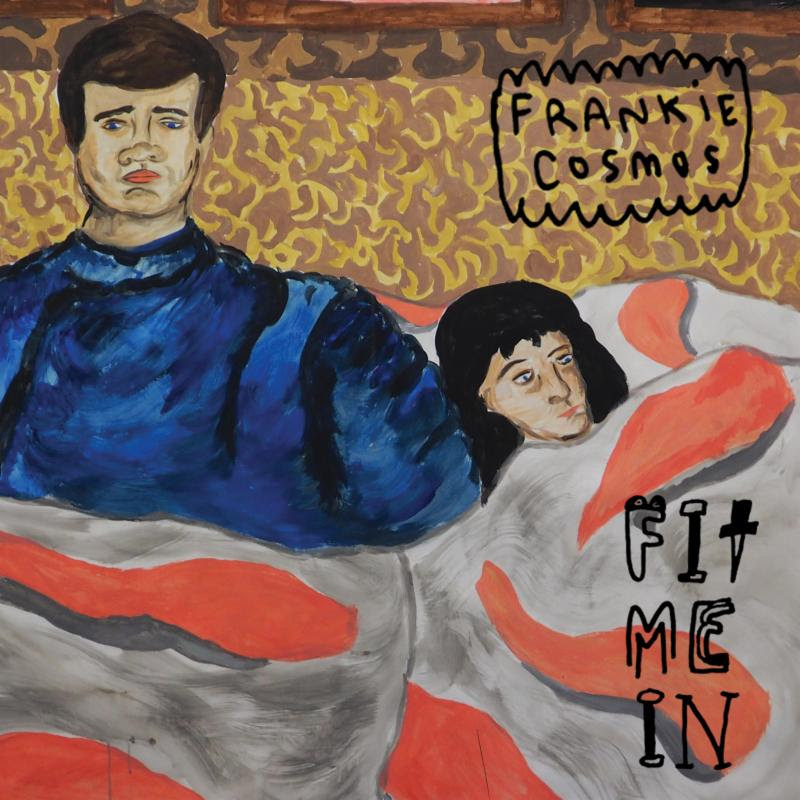
News
Cambridge Residents Slam Council Proposal to Delay Bike Lane Construction

News
‘Gender-Affirming Slay Fest’: Harvard College QSA Hosts Annual Queer Prom

News
‘Not Being Nerds’: Harvard Students Dance to Tinashe at Yardfest

News
Wrongful Death Trial Against CAMHS Employee Over 2015 Student Suicide To Begin Tuesday

News
Cornel West, Harvard Affiliates Call for University to Divest from ‘Israeli Apartheid’ at Rally
'Fit Me In' A Brief But Explosive Offering From Frankie Cosmos
Frankie Cosmos-'Fit Me In'-Bayonet Records

Frankie Cosmos’s latest release, a trim seven-and-a-half-minute EP entitled “Fit Me In,” offers a vision of what her music might sound like were she to refashion her guitar-driven indie jangle into slightly skewed synth pop. Greta Kline, under the stage name Frankie Cosmos, is known for her deceptively simple indie pop, witty and incisive lyrics, and incredibly prolific output—her Bandcamp is home to some 50 releases. Like a number of other young singer-songwriters, Kline has benefited from her ability to easily self-release her music and has, for the past several years, been meticulously honing her craft, producing ever more perfect and intricate songs. Her debut studio album, “Zentropy,” released last year on Double Double Whammy, was an absolute breakthrough success. A follow-up will be released next year on Bayonet. “Fit Me In,” sandwiched between these two larger, more straightforward releases, is something else entirely—billed as an experimental one-off, it offers an intriguing alternative vision of what Frankie Cosmos music could sound like. The EP demonstrates that, if anything, Kline isn’t content to rest on her indie pop laurels but is still striving for more varied modes of expression.
“Fit Me In,” which Kline created with frequent collaborator Aaron Maine of the indie rock-moving-towards-electronica band Porches, draws both from indie pop proper (think the D.I.Y. twee punk of early K releases) and from “indie” pop (think contemporary groups like Lower Dens, Purity Ring, and many others of the so-called “metropopolis”). While Kline pulls elements from both of these genres, her music is resolutely, distinctly her own—sweet, sad, slow, spare, and a little strange.
The EP opens with a reworked version of “Korean Food,” a track Kline first released on her 2013 demo “Daddy Cool.” “Korean Food”—initially a droney two-chorder that had an eerie sound—has here been pepped up with slightly more tuneful synths and even a drum machine beat. Like “Sand,” the last track on the EP, “Korean Food” is a beautifully, if briefly, sketched picture of a relationship. In an interview with the Hartford Courant, Kline described the EP as being inspired in part by The Magnetic Field’s three-volume indie-pop classic “69 Love Songs.” Kline’s sonic landscape recalls Stephen Merrit’s idiosyncratic pop vision, and her lyrics, like his, evocatively capture love and intimacy in wonderfully and powerfully offbeat and unusual ways. For instance, in “Sand,” Kline paints a sweet and gently sensual image of physical intimacy in a relationship—by focusing on touch and texture. “I want to kiss your stupid thumb,” she begins, continuing with descriptions of hair and hand holding, and concluding: “touch all the books outside The Strand / the oldest pages soft like sand.” At a mere 49 seconds, it is a perfect pop jewel—tiny, radiant, and beautifully formed.
Kline is a terrific lyricist, and her graceful, witty, and insightful lines are one of the highlights of her music. Critics have often focused on the diaristic or confessional elements of her writing. While Kline certainly draws on her personal experience in writing her poetic lyrics, her works don’t evoke the great confessional singer-songwriters as they do the works of those in the New York School. Kline is a fan of Frank O’Hara—her stage name intentionally evokes his—and it shows. Like his best poems, her best songs have a personal, conversational, but elevated, quality—they are marked both by a loose, free-flowing of ideas and a sense of composed wit. She shares with him a certain wry and slightly ironic vision.
Her dry wit is best on display on the most original track on the EP—the stunning, bedroom pop par excellence “Young.” The track, a wry take on what it means to be young, let alone a visible millennial voice, features Kline’s deadpan delivery of slightly sardonic lyrics such as: “wrote some songs that I sung / and have you heard that I’m so young?” The accompanying instrumentation, which contains, among other sounds, lounge-y, slightly atonal synths, a lovely, beautiful chorus of angelic Frankies, a rich organ-y synth, and a sort of thump clap drum machine beat, is a delightfully Frankie-ish take on pop music. About midway through the two minute run, the track moves from something cynical to something a little more melancholic—Kline sings wistfully about the promised, if not quite experienced, fun of youth. As the song finishes, Kline stakes an existential claim for herself, amidst her malaise; “I just want to be alive that’s it,” she seemingly concludes. There are a few moments of pause, a sort of fake-out ending, and then Kline returns, singing the word “alive” twice, with a hauntingly beautiful intensity. It is a deeply moving ending to a masterful track.
Want to keep up with breaking news? Subscribe to our email newsletter.
